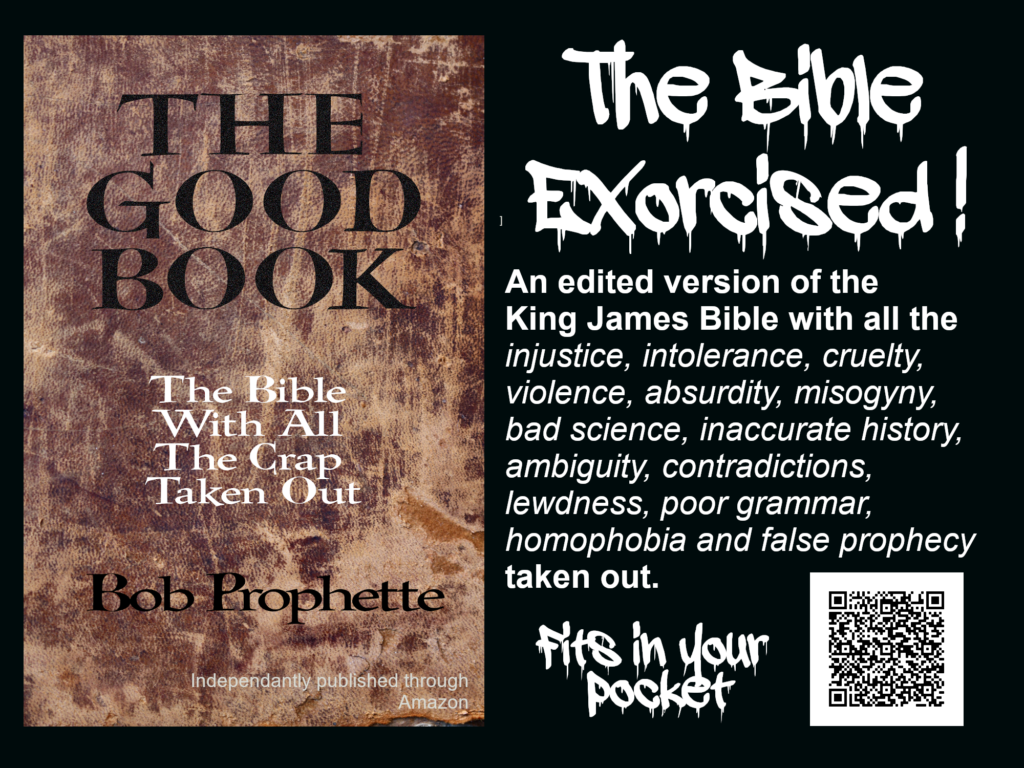A reimagining of biblical content, stripping the ancient text down to only the passages deemed “Good.” Inspired by Steve Wells’ Skeptic’s Annotated Bible, this satirical work pulls from a tradition of critical analysis that reduces the Bible’s content into classifications like injustice, intolerance, violence, absurdity, contradictions, misogyny, bad science, and homophobia. Wells’ work provided the opportunity to focus exclusively on passages deemed “Good,” resulting in a minimalist version of the Bible that invites readers to reconsider the sanctity and narrative of this revered text.
The Good Book, however, is more than an edited text—it’s a commentary on the practice of selecting and sanitizing scripture to align with current cultural values, often rebranding problematic content as “allegory.” This approach critiques the tendency to overlook or soften morally challenging aspects of the Bible, highlighting Prophette’s intent to expose both the merits and flaws of the Bible without the rose-colored filter through which it’s frequently viewed. His project asks a difficult question: can we embrace the Bible’s positive teachings without acknowledging the darker aspects of its narrative?
For Prophette, reducing the Bible to palatable parts is akin to exorcising its essence, as though one could extract only what’s agreeable and discard the rest. He challenges readers to recognize the Bible as a complex and invaluable product of human imagination, crafted over millennia by people who lived in vastly different times and cultures. While today’s readers may find many passages uncomfortable or difficult to reconcile with modern sensibilities, Prophette contends that these very aspects are crucial. Rather than seeing the Bible as merely a moral guide, he views it as a window into ancient civilizations—a text that reveals more about its authors and their lives than it should about the readers or moral standards of today.
In paring the Bible down, Prophette creates a slim, portable version that feels almost like a self-help book with a biblical flair. It’s compact, accessible, and refreshingly different from any traditional Bible one might carry. But this handy pocket-sized book, in all its brevity, serves a critical function: it sheds light on how little of the Bible, in its entirety, aligns with modern ideas of goodness, peace, and virtue. This stark revelation invites readers to confront the selective nature with which the Bible is often taught, read, and revered in contemporary society.
Prophette’s Good Book is more than satire—it’s an invitation to think deeply about the Bible’s role in modern life. For those who see the Bible as a timeless moral beacon, this book asks them to question why certain portions are heralded and others ignored. For secular readers, it serves as a reminder of the Bible’s value as historical literature, rich in human history and cultural legacy, even if its teachings are not universally applicable or agreeable. Prophette himself admits he is neither religious nor particularly spiritual. His appreciation of the Bible comes from its standing as an ancient text, invaluable in understanding humanity’s past—a sentiment that he argues should be shared by believers and non-believers alike. To him, the Bible’s worth is not tied to the divinity it describes but to the raw, unfiltered glimpse it offers into human imagination and experience.
In the end, Prophette’s Good Book is less about rewriting the Bible than it is about re-seeing it. He invites readers of all backgrounds to engage with the text as they would any ancient literature—honestly, critically, and without the need to reconcile it with modern values. In doing so, he hopes to open new dialogues about the Bible, not as an untouchable sacred artifact but as a dynamic and deeply human document, flawed and remarkable all at once.
The Good Book is available from all bookstores.
